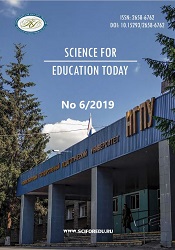Формирование образа просвещенного гражданина страны через СМИ: лингво-культурологический аспект
Creating the image of an enlightened citizen through the print media: Linguistic and cultural aspects
Author(s): Aleksandra Vasilievna KokovaSubject(s): Sociolinguistics, Theory of Communication
Published by: Новосибирский государственный педагогический университет
Keywords: Image of an enlightened citizen; Enlightened citizen; Print mass-media; Text scheme; Didactic function; Argumentation; Text modeling; Social and political journalism
Summary/Abstract: Introduction. The article discusses the issues of creating the image of an enlightened citizen through the prism of German print media in the 19th century. The purpose of the research is to reveal linguistic and cultural aspects of creating the image of an enlightened citizen through the print media. Materials and Methods. The research is based on authentic texts of German print media (newspapers and magazines of the 19th century) and Russian and international works on social history and philosophy of Germany. The key research methods and approaches include the following: functional-pragmatic and textual approaches, modeling and logical-semantic analysis of sentences and texts, and the analysis of communicants’ interactions. Results. The author has examined the evolution of the types of print media influence on readers, which is characterized by a breakaway from rigid textual schemes of classical rhetoric, from emotional and evaluative means of literary romance and the transition to rigor and a clear sequence of methods of scientific and practical reasoning. The image of enlightened citizens in the mirror of the German media is formed on the basis of social and political activities aimed at profound changes in the political image of the country. It has been proven that the leading principles in creating the image of an enlightened citizen are the general principles of democratization, as well as the language and style of the print media, which is fully consistent with the societal needs. High societal requirements for the language of the media, well-developed didactic functions of the press predetermined the stylistic closeness of the German media to the language of science. The dynamics of developing German print media in the 19th century was examined by comparing two main social matrices: historical-political and linguistic-cultural. Based on linguistic and cultural parameters (linguistic-cognitive and structural-typological), 4 periods in the formation of German journalism have been distinguished: 1) romantic-pathetic; 2) appeal categorical; 3) rational and analytical; 4) intellectual. An enlightened citizen of Germany at the end of the period under review, through the prism of the best German print media, appears as a well-educated, socially and politically active person possessing deep knowledge of logical and linguistic norms of speech, style and literature. Conclusions. The author has revealed the main principles of creating the image of an enlightened citizen in the 19th century by means of German print media – the principles of causality and appropriateness. An enlightened German citizen at the end of the period under review, through the prism of quality print media, appears as a well-educated, active in socio-political terms person with a strong command of literary language and style.Introduction. The article discusses the issues of creating the image of an enlightened citizen through the prism of German print media in the 19th century. The purpose of the research is to reveal linguistic and cultural aspects of creating the image of an enlightened citizen through the print media. Materials and Methods. The research is based on authentic texts of German print media (newspapers and magazines of the 19th century) and Russian and international works on social history and philosophy of Germany. The key research methods and approaches include the following: functional-pragmatic and textual approaches, modeling and logical-semantic analysis of sentences and texts, and the analysis of communicants’ interactions. Results. The author has examined the evolution of the types of print media influence on readers, which is characterized by a breakaway from rigid textual schemes of classical rhetoric, from emotional and evaluative means of literary romance and the transition to rigor and a clear sequence of methods of scientific and practical reasoning. The image of enlightened citizens in the mirror of the German media is formed on the basis of social and political activities aimed at profound changes in the political image of the country. It has been proven that the leading principles in creating the image of an enlightened citizen are the general principles of democratization, as well as the language and style of the print media, which is fully consistent with the societal needs. High societal requirements for the language of the media, well-developed didactic functions of the press predetermined the stylistic closeness of the German media to the language of science. The dynamics of developing German print media in the 19th century was examined by comparing two main social matrices: historical-political and linguistic-cultural. Based on linguistic and cultural parameters (linguistic-cognitive and structural-typological), 4 periods in the formation of German journalism have been distinguished: 1) romantic-pathetic; 2) appeal categorical; 3) rational and analytical; 4) intellectual. An enlightened citizen of Germany at the end of the period under review, through the prism of the best German print media, appears as a well-educated, socially and politically active person possessing deep knowledge of logical and linguistic norms of speech, style and literature. Conclusions. The author has revealed the main principles of creating the image of an enlightened citizen in the 19th century by means of German print media – the principles of causality and appropriateness. An enlightened German citizen at the end of the period under review, through the prism of quality print media, appears as a well-educated, active in socio-political terms person with a strong command of literary language and style.
Journal: Science for Education Today
- Issue Year: 9/2019
- Issue No: 6
- Page Range: 121-135
- Page Count: 15
- Language: Russian

